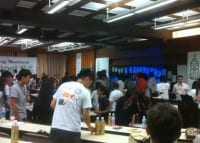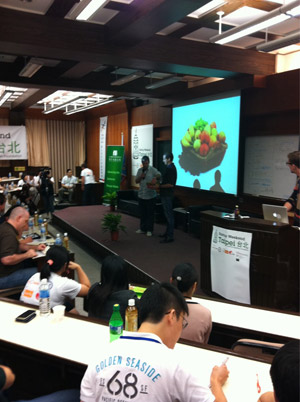By: Duncan Murtagh
At last weekend’s Taipei Startup Weekend, 3 young men – an Irishman, a Canadian and a Swede took up the challenge. Did they make it? Read their story.
A young man has a brainwave – an impractical one!
I work in a Taiwanese bank and about one year ago I heard our boss complaining about not enough ideas bubbling up from the team. I thought nothing of this until I heard a friend of mine, founder of a local tech company, complaining about the same thing. Then and now, I use many simple web based solutions such as Campfire and wondered if there was an inexpensive, no frills, works straight-out-of-the-box idea management system that could tackle this problem. I found none and that got me wondering if I could create something?
I dreamed up an internal Twitter system where the staff votes for/against the ideas submitted. I named it IdeaSift and pictured a rich future! However as time passed and IdeaSift rolled around my head like a sock in a tumble dryer, I concluded that yet another distracting system would not be welcomed by a manager, plus it takes a certain talent to boil down an idea for innovation or improvement to just 140 characters.
Everything changed when in April of this year, my Canadian colleague Steven Thomas, told me he was going to build an idea capture tool for consumers, mostly just for fun. I mentioned IdeaSift to Steven, this time suggesting that we build it around existing company email addresses. Steven was intrigued and we agreed we’d give it a try sometime in late summer, as I was busy organizing my May wedding back in Ireland. Soon after, in a moment of great serendipity, we heard that Startup Weekend was coming to Taipei for the first time on August 12-14. Startup Weekends are 54-hour events where developers, designers and marketers come together to build products and launch startups. We signed up immediately.
Startup Weekend Taipei – time for actions not words
 Friday August 12th arrived and at 7 pm at the NCC University, I gave a rough 60 second pitch about Vetter. This pitch is directed at the other participants, with a goal of assembling a strong team. The pitches are followed by some “organized chaos” as participants try to get on the team with the idea they are most interested in and team leaders (like me) vie to get the strongest talent. I wanted to keep our team as small as possible, and maybe capture a web designer. I didn’t get one but I did capture Fred, a Google AdWords whizz from Sweden who complemented the team nicely. While other teams were still being formed, we quietly retreated to the assigned workspaces to brainstorm how to build the best simple idea management system possible, in just 54 hours.
Friday August 12th arrived and at 7 pm at the NCC University, I gave a rough 60 second pitch about Vetter. This pitch is directed at the other participants, with a goal of assembling a strong team. The pitches are followed by some “organized chaos” as participants try to get on the team with the idea they are most interested in and team leaders (like me) vie to get the strongest talent. I wanted to keep our team as small as possible, and maybe capture a web designer. I didn’t get one but I did capture Fred, a Google AdWords whizz from Sweden who complemented the team nicely. While other teams were still being formed, we quietly retreated to the assigned workspaces to brainstorm how to build the best simple idea management system possible, in just 54 hours.
Are we solving a problem that anyone really has?
Early Saturday morning, Fred and I started researching managers’ attitudes to ideas – ‘Are they getting enough good ideas?’ or ‘are they not getting enough ideas?’ were some of the questions we asked. We used LinkedIn, Twitter, email and later in the day, when the western world was fully awake – Skype. At the same time, Steven was busy coding – setting up a simple website, user log-in systems, etc.
Focusing on the goal
In the excellent book Made to Stick, the authors discuss the ‘Commander’s Intent’. The Commander’s Intent is written at the top of a military action plan. It boils down the objective of an action to just 1-2 sentences and mitigates the problem of “no plan survives contact with the enemy”. I wrote out our Commander’s Intent and battle commenced: “To create a service that delivers a weekly email full of quality ideas to a manager”. Next we had to pick a name as over time I had grown to dislike the name IdeaSift. We needed something snappier, something to communicate that our system delivers ideas that make your business better. I used an online tool to look at verbs connected to voting and filtering. ‘To vet’ didn’t immediately jump out at me, but after a while a slight modification, that’s easy to spell and reminds people of ‘better’ came to mind – ‘Vetter’!
Thinking out the system
We needed a system that would reduce the chance of a painful rejection of an idea and track who’s offering up ideas.
By Saturday evening we were beginning to get a picture of the problems managers have: 1) staff are sometimes shy and fear the rejection of having their ideas knocked back; 2) staff worry that their ideas won’t get rewarded and 3) some staff just don’t know that ideas and suggestions are welcome. So we needed a system that would reduce the chance of a painful rejection of an idea and track who’s offering up ideas. The very fact that a company has introduced a system like Vetter communicates that ‘ideas are welcome’ so we probably have No. 3 covered. We initially thought a voting, or rather – vetting, system would prevent bad ideas from getting to managers. But our chats with various managers found that nobody had the problem of too many bad ideas, the problem was not enough ideas. Next we debated scrapping the vetting, but soon realized that we’d make a submission tool and a company could create an email address ideas@companyname.com and that’d do the same thing. We put our thinking caps on and realized that our objective is not to deliver just good ideas, but rather – remove the bad ones and let the manager take it from there. Additionally, a vetting system would force submitters to write concisely and only submit fully thought out ideas.
Caffeine kicks in – breakthroughs follow
One of the best features of these events are the Startup Weekend mentors. We received some great tips, one in particular advised us to have a set time each day that the ideas submitted are piped out for vetting – that way users get into a habit. 12 noon seemed the best time, with the hope that most users would return from lunch and see spending 5 minutes (idea wordcount is restricted) voting on the newly submitted ideas as a good way to ease back into work. Another brainwave that we had – a twist that would keep the vetting unbiased and not embarrass someone whose idea proved unpopular – was to keep it anonymous at the vetting stage.
A fruity concept
 The hours flew by and before I knew it we were going to buy fruit in preparation for my pitch. We had noticed a certain slightly confused look on people’s faces when we described the system over the weekend. So we realized we needed something visual and fun to explain the concept. I came up with the concept that Vetter is like a good fruit seller, who removes the bad fruits (bad ideas) and neatly presents all the other fruits (the vetted ideas) to a customer (a manager).
The hours flew by and before I knew it we were going to buy fruit in preparation for my pitch. We had noticed a certain slightly confused look on people’s faces when we described the system over the weekend. So we realized we needed something visual and fun to explain the concept. I came up with the concept that Vetter is like a good fruit seller, who removes the bad fruits (bad ideas) and neatly presents all the other fruits (the vetted ideas) to a customer (a manager).
Pitch time
At 8 pm on Sunday night we took to the stage, a little nervous. Luckily I remembered everything, made some jokes and coped with a technical hiccup that actually benefitted us in that it showed that we had a live system rather than just a PowerPoint deck. After the pitch, we were grilled by the judges, who were mostly Venture Capitalists. The one question that I couldn’t answer so well was “how will you find customers”. As readers know, the Innovation and Idea Management space has some big established players who bid up the price of advertising and make SEO difficult, and I had no choice but to admit that this is our biggest challenge. Some speculated that this may have cost us 1st place.
Winners announced
After the pitches were done we felt we had a good chance to finish in the top 3, as we had a working product and our pitch was well received. At about 9 pm, Jamie Lin, the creator of Taipei’s first startup incubator, announced that we came 2nd. We were thrilled. Our prizes consisted of about $1000 in cash, vouchers for virtual office services & Amazon webs services and possibly best of all – 5 hours of mentoring from Anthony Ives, a very experienced entrepreneur, based in Taiwan.
What’s next – a re-launch on September 1st
An amazing 75% of participants in Startup Weekends plan on continuing work on their startup ventures after a Startup Weekend. Vetter too, will live on, especially as we’ve already recruited some beta users. We’re going to hone the product over the next 2 weeks and launch publicly on September 1st. Meanwhile, congratulations to the winners FoodJing – a service that compiles local restaurant menus and allows a user to search for a specific dish located nearby. Foodjing won the sprint, but who’ll win the marathon? We’ve adopted Avis’s slogan – “We‘re number two, so we try harder” – let the race begin!
By Duncan Murtagh
About the author
 Duncan Murtagh is co-founder of Vetter, a simple Idea Management System built at Taipei Startup Weekend in August 2011 and honed and polished in the 2 weeks that followed. Originally from Ireland, Duncan has worked in a diverse range of industries, from construction to financial services, in Ireland, the USA and Taiwan.
Duncan Murtagh is co-founder of Vetter, a simple Idea Management System built at Taipei Startup Weekend in August 2011 and honed and polished in the 2 weeks that followed. Originally from Ireland, Duncan has worked in a diverse range of industries, from construction to financial services, in Ireland, the USA and Taiwan.
